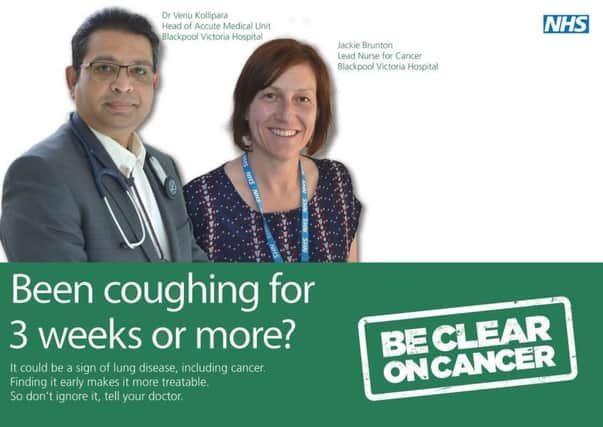GPs highlight '˜red flag' cancer symptoms you should look out for


Hospital staff and GPs say identifying conditions early makes them more treatable, and say anyone who is concerned should see their doctor as soon as possible.
Readers have also been urged to see their GP if they have had a cough for three weeks or more.
Advertisement
Hide AdAdvertisement
Hide AdThe call came as part of the national ‘Be Clear on Cancer Respiratory Symptoms’ campaign, which is running until late August and is being backed by local commissioners and chiefs at Blackpool Victoria Hospital.
Lead cancer nurse at the Vic, Jackie Brunton, said: “Be Clear On Cancer campaigns aims to improve early diagnosis of cancer by raising awareness of signs, and symptoms of cancer, and to encourage people to see their GP without delay.
“We want people to seek advice and help from GPs early to enable us to undertake appropriate tests to either reassure you, or if we do diagnose something more serious, then quickly provide treatment.
“Lung cancer survival is much higher the earlier we detect it – the main thing is to chat through with your GP in the first instance.”
Advertisement
Hide AdAdvertisement
Hide AdThe campaign is being mainly aimed at people over the age of 50 – the group most at risk of having undiagnosed respiratory illnesses and which makes up 97 per cent of all lung cancer diagnoses.
Dr Adam Janjua, a GP at the Fleetwood Surgery, said: “Smokers are especially at risk. A lot of smokers think it might just be a ‘smoker’s cough’, but it is better to err on the side of caution and get such coughs checked out.
“As GPs, we want people to come and see us if they have what we call red flag symptoms of cancer – we don’t want people to leave it until it’s too late. Early detection, diagnosis, and treatment will enable patients to live normal and healthier lives.”